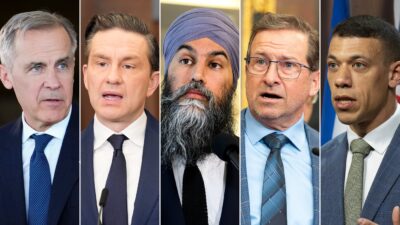Carney, Poilievre align on pipelines as Trump and trade loom over French debate
By Canadian Press on April 16, 2025.

OTTAWA — Liberal Leader Mark Carney and Conservative Leader Pierre Poilievre aligned on support for new oil and gas pipelines as a matter of national security during the French language election debate Wednesday night.
Dealing with U.S. President Donald Trump was a running theme as the four main federal party leaders took the stage in Montreal for the first of two debates. Even the debate moderator Patrice Roy cited the elephant in the room as he pitched questions on immigration, affordability and Canadian identity.
During an exchange on climate change, Poilievre argued that Canada needs to build a national pipeline, pointing out that Alberta oil and gas is transported east through pipelines passing into the United States.
“Quebecers that buy Alberta oil, it needs to go through the United States, giving the power to Donald Trump on our own energy,” Poilievre said, addressing Bloc Québécois Leader Yves-François Blanchet.
“You say you’re for sovereignty? I’m for economic and energy sovereignty. And it takes a pipeline across Canada.”
“The Americans will never damage their own economy to the point of saying ‘Okay, we’re going to prevent the trade of a product in which we’re making enormous profits,’” Blanchet snapped back.
“That’s an extraordinary argument. And tell me how much your oil pipeline will cost. Because 1,600 kilometres for Trans Mountain cost $40 billion. And now you want to build one 4,600 kilometres, without investors and with Europe not wanting it.”
Poilievre said that a Conservative government led by him would never subsidize pipelines.
“It’s not necessary. They’re extremely profitable,” he said. “The only reason it costs a lot right now is because we have laws and rules that prevent construction with bureaucracy.”
Carney jumped in at that point — when he was trailing Poilievre and Blanchet’s speaking time by more than a minute because he was fending off attacks throughout the evening. He agreed with Poilievre’s concerns about Canadian energy passing through the United States.
“Our relationship with the United States has completely changed. So imports from the United States and the geography — as Mr. Poilievre just said — of the pipelines is a national security problem for us,” Carney said.
“We have to act.”
Carney said that during his latest meeting with Canada’s premiers, they agreed on developing a national energy corridor and removing trade barriers to build projects faster.
In an earlier exchange, Blanchet said he was in favour of Canada producing less oil and gas because the cost of failing to address climate change is too great.
“We have to progressively get out of oil because the cost per family is higher than all the horrible scenarios that Mr. Poilievre is raising,” Blanchet said.
“Reparations from damage from climate change costs thousands of dollars per family per year.”
The debate began with the leaders sparring over how to respond to the trade war with the United States and pitching themselves as the best one to negotiate with President Donald Trump.
Poilievre said that on his first day in office, he would open negotiations with Trump on an agreement to put an end to tariffs.
“We can’t control Trump. So at the same time, we need to control what we can,” Poilievre said.
“That means reversing the Liberal economic policies which have weakened our country, unlocking our (natural) resources, cut taxes, bring jobs here to face Trump with strength.”
Carney said Canada needs to plan for the worst-case scenario and have a strategy to build a stronger economy.
“It’s those elements that will work with Trump. He respects strength, he respects people who know how the world and the private sector works,” he said.
“Canada has to create other options, new international trade partners, and that’s what I promise.”
Blanchet said Canada needs to align with countries that are being affected by U.S. tariffs and “negotiate rationally.”
“Trump will hang himself with his own cord because his measures are extremely toxic to the U.S. economy,” he said. “In the meantime, he will also create damage everywhere.”
NDP Leader Jagmeet Singh said Canada needs to prioritize what matters most and invest rather than cut.
“Like our agriculture, our culture, our French language, not sacrifice it,” Singh said.
“A profound value for us is taking care of each other. How we do that is reinforcing our health-care system, not Americanizing it.”
The party leaders were also asked which U.S. products they’ve cut from their daily lives.
All other party leaders took a dig at Carney by saying they no longer buy U.S. strawberries. In a recent interview with a Quebec talk show, when asked if he still buys U.S. strawberries, Carney said he doesn’t buy his own groceries.
“No more wine, no more American alcohol,” Carney said.
“I do my own groceries, and I cook myself. So lots of fruit,” Singh said.
“This is a delicious conversation,” Poilievre quipped, adding he buys Canadian beef.
Earlier in the debate, Carney cited his promises to double housing construction, while Poilievre vowed to cut income taxes and the GST on new homes.
Blanchet said Quebec should have the right to run its own economy, using its own natural resources. Singh prioritized health care, noting his party’s efforts to secure dental and pharmacare programs under the previous government.
The first of the election’s two debates is structured around five key topics: the cost of living, energy and climate, the trade war, identity and sovereignty, and immigration and foreign affairs.
The Green party was removed from the debate early Wednesday after fielding candidates in less than 70 per cent of ridings.
This report by The Canadian Press was first published April 16, 2025.
Nick Murray, The Canadian Press
-41


